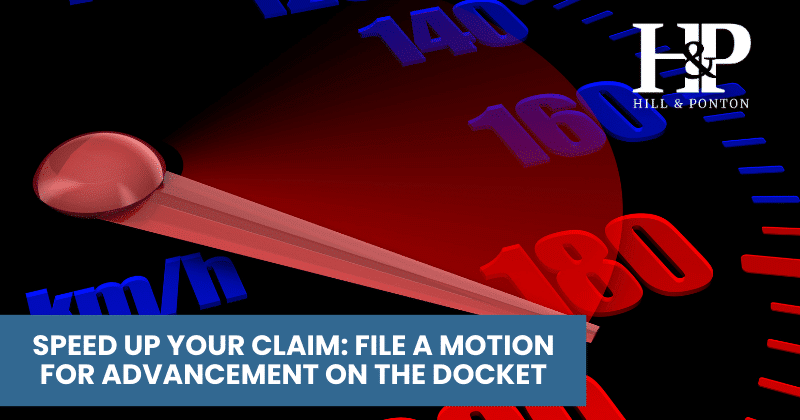VA disability claims can take years to process, causing unnecessary challenges for veterans and their families. One way to expedite the process is by filing a “Motion for Advancement on the Docket” (AOD). This motion, when granted, allows your appeal to be reviewed ahead of others in the Board of Veterans Appeals (BVA) queue.
What Is a Motion for Advancement on the Docket (AOD)?
An AOD is a formal request asking the BVA to expedite its review of your appeal due to unusual hardship or other qualifying circumstances. According to 38 U.S.C. § 7107(a) and 38 C.F.R. § 20.902(a) and (b), the BVA dockets appeals in the order in which they are received and then considers the appeals in the order in which they were entered into the docket. Filing an AOD can push your appeal ahead in this queue if you meet the criteria.
Veterans can file an AOD for the following reasons:
- Financial Hardship – Bankruptcy, foreclosure, homelessness, or inability to cover basic living expenses.
- Serious Illness – Terminal illness or severe medical conditions (e.g., cancer, COVID-19).
- Advanced Age – Defined by the BVA as 75 years or older.
- Administrative Errors – Those that result in significant delay in docketing the case.
- Other Administrative Necessity – Including situations where your case involves interpretation of law of general application to other claims.
- Other Sufficient Cause – Examples could include natural disasters such as severe damage from hurricanes, floods, or similar events.
Widows or dependents filing Dependency and Indemnity Compensation (DIC) claims can also use AOD to expedite cases tied to a veteran’s service-connected death.
How to Qualify for a Motion for Advancement
Financial hardship
Financial hardship refers to extreme financial distress that impacts your ability to maintain basic living conditions. Examples include:
- Eviction notices
- Overdue utility bills
- Bankruptcy filings
- Foreclosure documents
If you submit sufficient evidence of financial hardship, the VA may also “flash” your file, signaling employees to prioritize your case at every stage.
Homelessness
Veterans who are homeless or at risk of becoming homeless can qualify for expedited treatment. The VA follows the definition of homelessness outlined in 42 U.S.C. § 11302, which includes lacking a fixed, regular nighttime residence or living in non-standard accommodations like vehicles or shelters.
Serious Illness
Veterans with severe or terminal illnesses must provide documentation to qualify for an AOD. Required evidence includes:
- Medical records from VA or private providers
- Letters from treating physicians
- Diagnostic test results
Advanced Age
Veterans aged 75 or older can qualify based solely on their age. Proof of birth date, such as a birth certificate, is required.
Natural Disasters
Natural disasters that cause significant damage, such as hurricanes, floods, or fires, may justify an AOD. Supporting documentation can include:
- FEMA assistance records
- Photographs of damage
- Insurance claims
Administrative Errors
If delays in processing your claim are due to administrative mistakes, you can cite this as grounds for advancement. Include any supporting evidence of errors or delays in your motion.
Caregiver and Survivor Specific Considerations
Caregivers filing for an increased rating or Aid & Attendance (A&A) benefits may qualify for an AOD if their caregiving responsibilities or financial strain create unusual hardship. Widows filing for DIC benefits can submit an AOD to expedite claims tied to a service-connected death, especially if financial hardship or advanced age is a factor.
How to File a Motion for Advancement on the Docket
To file an AOD, you must submit a written request with the following information:
- Specific Reason: Clearly state why you are requesting advancement, referencing one or more qualifying circumstances.
- Personal Information: Include your name, the appellant’s name (if different), and your VA file number.
- Supporting Evidence: Attach all necessary documentation, such as medical records, financial statements, or disaster reports.
- Submission: Mail or fax your request to the BVA
Board of Veterans’ Appeals
P.O. Box 27063
Washington, DC 20038
Fax: 844-678-8979
It’s highly recommended to use Certified Mail Return Receipt Requested to confirm delivery and keep copies of all submitted materials.
When to File a Motion for Advancement
You can file an AOD at any stage of the appeals process before the BVA issues a decision. For instance:
- After Filing a Decision Review Requisition (DRR): Submit the motion alongside your DRR to speed up the process from the start.
- During the Appeals Process: File at any time before the BVA renders a decision.
Always maintain a copy of your records, as the VA may request additional documentation.
Common Misconceptions About AODs
- Purple Heart Recipients and POWs: While Purple Heart recipients and former prisoners of war (POWs) receive expedited treatment at the Regional Office level, these honors alone do not qualify for advancement at the BVA.
- Automatic Advancement: Filing a motion does not guarantee approval. You must meet the specified criteria and provide strong evidence.
What Happens After Filing an AOD?
Once submitted, the BVA Vice Chairman or a designated Deputy Vice Chairman will review your motion. If denied, you will receive notification with the reason for the decision. If approved, your case will be prioritized, and this advancement will be noted in the BVA’s final decision.
Get Help Filing a Motion for Advancement
Navigating the appeals process can be overwhelming, especially when facing financial or medical hardships. At Hill & Ponton, we specialize in winning appeals for disabled veterans who were denied or underrated by the VA.
We can help you file a motion for advancement and secure the benefits you deserve. Contact us for a free case evaluation.




